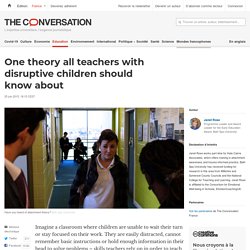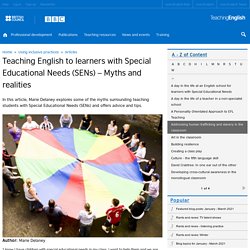

YouTube. This ‘Kindness Curriculum’ Is Free And Should Be Used In Every Classroom. Imagine living in a world that valued kindness enough to teach it along with academics. Educators would teach kids to manage their emotions in addition to standard curriculum such as math and science. Sounds pretty amazing, doesn’t it? Well, the Center for Healthy Minds at the University of Wisconsin-Madison has created a free “kindness curriculum” for kids, designed to do just that. 21 of the Best Early Years Books for International Friendship Day. We know that skills like empathy aren’t fully developed until later in a child’s life, which is why there are so many stories on friendship and how to treat people aimed at Early Years.
International Friendship Day, then, is a great opportunity to share some of these amazing books with your children. It does, however, fall on Sunday 30 July. The Key to Effective Classroom Management. It’s a daunting but all-too-common sight for many teachers: A classroom full of rowdy students who are unable to focus on the lesson. Classroom management techniques may get things back on track, but valuable time has already been lost. Many experienced teachers know that making meaningful connections with students is one of the most effective ways to prevent disruptions in the first place, and a new study set out to assess this approach. In classrooms where teachers used a series of techniques centered around establishing, maintaining, and restoring relationships, academic engagement increased by 33 percent and disruptive behavior decreased by 75 percent—making the time students spent in the classroom more worthwhile and productive.
A 19-Year Study Reveals Kindergarten Students With These 2 Skills Are Twice as Likely to Obtain a College Degree (and They Have Nothing to Do With Reading) One theory all teachers with disruptive children should know about. Imagine a classroom where children are unable to wait their turn or stay focused on their work.

They are easily distracted, cannot remember basic instructions or hold enough information in their head to solve problems – skills teachers rely on in order to teach successfully. These behavioural issues are all examples of problems that can arise from attachment issues – based on the relationship between children and their main caregiver. Attachment theory is now one of the world’s most well-researched theories about human development. It was first proposed by the 20th-century British psychiatrist John Bowlby, who considered that children needed to develop a secure attachment with their main caregiver via sufficiently consistent, responsive, sensitive, appropriate and predictable care and support.
Don't Expect Toddlers To Behave Consistently — They Literally Can't. One day, when my oldest daughter was not quite 2, she wouldn’t sit still to let me change her diaper. Squirrelly and writhing, she made a game out of staying half naked. She wasn’t fussing about it or anything — in fact, she was giggling maniacally. Can Free Play Prevent Depression and Anxiety In Kids? Which Early Childhood Experiences Shape Adult Life? Why Empathy Holds the Key to Transforming 21st Century Learning. NQS_PLP_E-Newsletter_No36.pdf.
Key Person & Attachment - Early Years Matters. The Key Person. How Are Happiness and Learning Connected? As teachers, we also know that when students' affective filters or defenses are sky high, fight or flight responses will be modus operandi. A room full of defensive behaviors (withdrawn, angry) is a sad, unproductive place to teach and learn.
What to consider when teaching English in large classes. How many students do you teach? Do you feel that your classes are too big? Author and education consultant Jason Anderson looks at the issues and offers some potential solutions. For many of us, our classes are larger than we would like them to be. Sheona Gilmour - FutureLearn. Whole Child Development Is Undervalued. The question is how to make such an approach both systemic and sustainable. Whole Person Socio-emotional, physical, creative, and cognitive capacities are deeply intertwined and equally important in ensuring a child's wellbeing, learning, and growth. (That shouldn't be a surprise to anyone studying or supporting children's learning.) Nobel laureate James Heckman, a professor of economics at the University of Chicago, has shown that the non-cognitive skills emerging in early childhood are among the strongest predictors of adult outcomes.
Poems for kids. Nursery Rhymes and Songs - BBC Teach. Music and Movement Activities for Toddlers and Preschoolers. 50+ Quick & Easy Kids Crafts that ANYONE Can Make! Songs for kids. Short stories for kids. How to teach children English using illustrated storybooks.
What makes illustrated storybooks such a good resource for teaching young learners of English? The British Council’s Gail Ellis, co-author of a storytelling handbook for primary English language teachers, explains. Listen to an interview with Gail in our podcast and register for her webinar taking place on Thursday, 2 October. Illustrated storybooks provide an ideal resource for helping children learn English. This is because children love listening to stories. Primary Resources - KS2, KS1, Early Years (EYFS) KS3, KS4, Twinkl. How to help your child learn English with YouTube videos. Tracey Chapelton, education consultant and materials writer, has some advice for parents of young English learners, whose home language might not be English. To learn a language we need a lot of exposure to it. YouTube is beneficial if you are not a fluent English speaker, and want a more fluent model of English for your child.
Helped along by the visuals of their favourite cartoon, children can watch their favourite characters involved in adventures, while absorbing the language. Repetition is also important for language learning. It helps us remember important words and expressions. The Art of Control. Executive function — our ability to remember and use what we know, defeat our unproductive impulses, and switch gears and adjust to new demands — is increasingly understood as a key element not just of learning but of lifelong success.
Researchers at the Center on the Developing Child at Harvard University describe executive function as an air traffic control system for the mind — helping us manage streams of information, revise plans, stay organized, filter out distractions, cope with stress, and make healthy decisions. Children learn these skills first from their parents, through reliable routines, meaningful and responsive interactions, and play that focuses attention and stirs the beginnings of self-control.
Practical tips. By Opal Dunn, educational consultant and author Introduction Young children learn English differently from most adults.

Most have an innate ability to pick up English while taking part in activities, by making sense of what they are doing and picking up the adult’s language that accompanies the activity. You can find out more in the British Council booklet ‘How young children learn English as another language’, also available on the parents pages of the LearnEnglish Kids website. Serve and Return. Review English in Early Childhood: Language Learning and Development. (670) Quality Interactions Early Years. Effective Teacher-Child Interactions. The Brain-Changing Power of Conversation. The Science Researchers used highly faithful audio recorders — a system called Language Environment Analysis (known as LENA) — to capture every word spoken or heard by 36 4–6 year olds from various socioeconomic backgrounds over two full days.
The recordings were analyzed to measure the number of words spoken by each child, the number of words spoken to each child, and the number of conversational turns — back-and-forth exchanges initiated by either adult or child. Comparing those measurements with brain scans of the individual children, the analysis found that differences in the number of conversational turns accounted for differences in brain physiology, as well as for differences in language skills including vocabulary, grammar, and verbal reasoning.
Read the MIT News story for a fuller summary of the research. The Takeaways The “conversational turns” are key here, the researchers say. MIT Brain Study: Back-And-Forth Talk Key To Developing Kids' Verbal Skills. New MIT research finds that for children's brain development, parents don't just need to talk to their kids — it's important to talk with them, in back-and-forth exchanges. "What we found is, the more often parents engaged in back-and-forth conversation with their child, the stronger was the brain response in the front of the brain to language," said cognitive neuroscience professor John Gabrieli.
Story continues below Most Viewed Stories That stronger brain response, measured as children ages 4 to 6 lay in a scanner listening to simple stories, reflects a deeper, more intimate engagement with language, said graduate student Rachel Romeo. On average, a child from a better-off, more-educated family is likely to hear 30 million more words in the first three years of life than a child from a less-well-off family. NQS_PLP_E-Newsletter_No43.pdf. Listening Skills for Staff. A longitudinal investigation of the role of quantity and quality of child-directed speech in vocabulary development.
A longitudinal investigation of the role of quantity and quality of child-directed speech in vocabulary development. Listening Skills for Staff. B480 Special Need Publication A4 V5 Final MR. Neurodiversity TfS online conference. Teaching English to learners with Special Educational Needs (SENs) – Myths and realities. ‘I know I have children with special educational needs in my class, I want to help them and we are supposed to promote inclusion, but I really am not sure how to do this’ Vera, primary teacher from Spain ‘Some of the children in my class are really badly behaved, they can’t sit still, don’t finish their work and are always calling out.

I think they might have a learning difficulty, but I don’t know what to do’ Kris, secondary teacher from Poland Do you feel like these teachers? Myth 1 – You have to be a specialist psychologist or specially trained teacher to know how to teach these learners No, you don’t. Myth 2 – other learners in the class make less progress when they are taught with learners with SENs No, this is not necessarily the case. Myth 3 – learners with SENs cannot learn languages No, this does not have to be true.
2Bbellybreathhome. Schema and Fairies. Schemas in Children’s Play - N a t u r e P l a y. "I Said I Want the Red Bowl!" Responding to… Does my toddler have a short attention span because she won’t sit still for a story? Deconstructing Role Play – Provide the Resources, Step Back and Watch Children’s Learning Flourish.
Our play resources. Deconstructing Role Play – Provide the Resources, Step Back and Watch Children’s Learning Flourish. Symbolic play and language development. Deconstructing Role Play – Provide the Resources, Step Back and Watch Children’s Learning Flourish. Scientists Say Child's Play Helps Build A Better Brain : NPR Ed : NPR. The cognitive benefits of play: Effects on the learning brain. © 2008 - 2014, Gwen Dewar, Ph.D., all rights reserved Science supports many of our intuitions about the benefits of play.
Low-cost play ideas: video. Primary school shake-up to focus on ‘play-led’ learning. Children at primary schools would not study traditional subjects until as late as 10 years of age, under proposals being considered by policymakers. Instead, there would be a much greater emphasis on creative play during the early years of primary school, and broader areas of learning in later years. The reforms are based loosely on some of the features of top-performing education systems in countries such as Finland, as well as new research on how children learn. Why Movement is Essential in Early Childhood. Play to Learn. David whitebread importance of play report. The Power of Evening Routines. How do you speak 'Motherese'?
(14) The Woman Who Changed Her Brain: Barbara Arrowsmith-Young at TEDxToronto. How baby brains develop. Early childhood development – it’s not rocket science, it’s neuroscience! You speak with an accent. I don’t. FAQ: Raising Bilingual Children. Deb Roy: The birth of a word. Listen to Your Mother. Let's Talk.
End of week 1 - English in Early Childhood - British Council. How can I help my child to start talking? (Video) Multilingual Preschoolers.